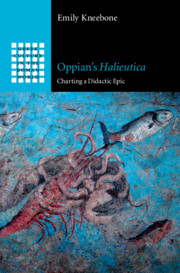Book contents
- Oppian’s Halieutica
- Greek Culture in the Roman World
- Oppian’s Halieutica
- Copyright page
- Epigraph
- Contents
- Acknowledgements
- Introduction: On Fishing
- Part I Didactic Poetry
- Part II Morality at Sea
- Chapter 4 Guile
- Chapter 5 Greed
- Chapter 6 Lust
- Part III Humans and Animals
- Part IV The World Is a Sea
- Bibliography
- Subject Index
- Index Locorum
Chapter 4 - Guile
from Part II - Morality at Sea
Published online by Cambridge University Press: 24 September 2020
- Oppian’s Halieutica
- Greek Culture in the Roman World
- Oppian’s Halieutica
- Copyright page
- Epigraph
- Contents
- Acknowledgements
- Introduction: On Fishing
- Part I Didactic Poetry
- Part II Morality at Sea
- Chapter 4 Guile
- Chapter 5 Greed
- Chapter 6 Lust
- Part III Humans and Animals
- Part IV The World Is a Sea
- Bibliography
- Subject Index
- Index Locorum
Summary
Part I of this book has explored the status of didactic poetry in the ancient world, arguing in Chapter 1 that generic conceptions of the close relationship between heroic and didactic epic represent less a definitional problem than a sphere of opportunity for ancient didactic poets, who often signal their affiliation to, and adaptation of, heroic as well as didactic traditions. Important too is the range of contexts in which both the ethical and the ‘technical’ content of the Homeric epics was taken seriously in the ancient world. Much of this book traces the permutations of these claims as they are refracted in the Halieutica. In Chapter 3, for instance, we saw that Oppian draws not only from didactic epic traditions but also from the address to the Muses and the Catalogue of Ships in Iliad 2 in order to foreground epistemological questions about the relationship between divine and mortal knowledge, immensity, and incapacity in his proem. Homeric approaches to the relationship between human and non-human animals will in turn be examined in Part III. As Chapter 2 has shown, moreover, Oppian emphasises the simultaneously sweet or pleasant and educational effects of his verse; these may be seen not as opposed but as intimately related facets of the poem. The work’s most ‘poetic’ elements, in other words, are often its most didactically potent, and the moral structure of Oppian’s marine world turns out to be deeply rooted in the traditions of hexameter epic.
- Type
- Chapter
- Information
- Oppian's HalieuticaCharting a Didactic Epic, pp. 113 - 144Publisher: Cambridge University PressPrint publication year: 2020



